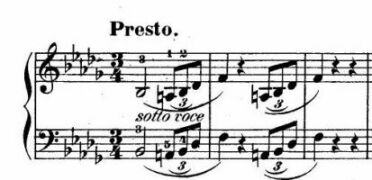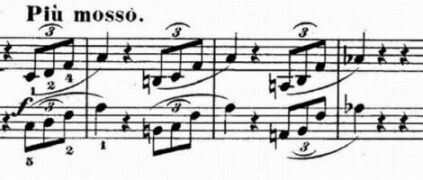|
Alfred Brendel is a concert pianist of some stature, as well as an essayist. His essay entitled "Does classical music have to be entirely serious?" was first delivered as a 1984 Darwin Lecture at Cambridge University, and subsequently published in Alfred Brendel on Music: His Collected Essays. We found this essay insightful and stimulating, but we could not help but quarrel with aspects of it as well.
Brendel sets out to present a survey of humor in music, warning that he considers it a subjective question. He "can therefore only submit a choice of pieces that I personally find funny, amusing, ludicrous, or hilarious, and I have settled for the word 'comic' to signify an ingredient that is common to all of them." He begins with classical music's king of comedy, Franz Joseph Haydn. As Brendel points out, Haydn as long been noted for his humor; in 1810, Ignaz Ernst Ferdinand Arnold observed that: | The last Allegros or Rondos consist frequently of short, nimble movements that reach the highest degree of comicality by often being worked out most seriously, diligently and learnedly.... Any pretense at seriousness only serves the purpose of making the playful wantonness of the music appear as unexpected as possible, and of teasing us from every side until we succumb and give up all attempts to predict what will happen next, to ask what we wish for, or to demand what is reasonable. |
Brendel does an admirably thorough and altogether splendid job of explicating the humor of Haydn, and continues with that of Beethoven, whom we suspect was greatly influenced by Haydn's approach to humor (Brendel dismisses, however, the rollicking humor of CPE Bach, which must have been an important influence on Haydn, calling it merely bizarre.) Along the way, Brendel makes the observation that music from the so-called "classical period" lends itself to comic effects because of its "solid and self-sufficient forms and structures"; the composer can surprise the listener, who is confidently awaiting a certain sort of outcome, with "breaches of convention." Contrast this with romanticism, the music of arbitrary effects. Brendel complains that with Berlioz, where "surprise becomes the governing principle of composition, and music a succession of feverish dreams, comic effects have little chance; they have to be achieved as an assault on what is proper and predictable." To our way of thinking, this demonstrates in Classical music a capacity for the communication of irony that makes it altogether superior to romanticism and its sundry offspring, but more about this later in the article.
Brendel finds a paucity of purely musical humor in Mozart, noting that "A Musical Joke" is not all that funny. We concur. Likewise Schubert, of whom Brendel writes that his music "hardly aspires to be comical."
So far, so good. But as he advances into the 19th Century, Brendel seems more and more not to "get the jokes." He writes of Schumann that his "Humour, wherever indicated in his music, is too good-humoured and warmly lyrical to be comic, and his capriciousness does not come from a light-hearted disposition." We can find no indication that Brendel ever recorded Schumann's Carnaval, which is to our thinking the apotheosis of his humor: the subtle grotesqueries and droll caricatures are all the more potent for being blended with aspects of the noble and tragic. As examples, we would cite the drolly echoing octaves of "Arlequin," or the passionate drama of "Florestan" which culminates in a ludicrous little traipsing figures of "Coquette," which in turn evolve into "Sphinxes." The rapid, repeated 16th notes of "Reconnaissance," which echo each long note of the melody an octave lower, have always impressed us as subtly and irresistibly comic. Likewise the "Valse allemande," alternately heroic and mincing.
Brendel writes that he "cannot find a trace of humour in the music of Chopin or Liszt." Regarding Liszt we will agree; but we must rise indignantly to the defense of noble Chopin, who presents us with one of the finest musical jokes that we know, appropriately in a Scherzo, the one in Bb minor.
Although "scherzo" is the Italian word for "joke," one does not ordinarily expect a Scherzo to be funny. It is a standard feature of sonata and symphony. In the case of Chopin's Bb minor, the piece opens with a darkly mysterious, almost ominous mood, exemplified by the leading tone+minor triad motif shown in Figure 1, below. It develops into one of Chopin's finest works, encompassing a kaleidoscopic array of affects, all very serious, and finally recapitulates the somber opening motif in a moment of high drama. But there are yet surprises in store. What begins as a general recapitulation of the opening theme veers into a section that becomes progressively wilder, until, in a moment of audacious comedy, the motif appears in the major, moving downward by half-steps (Figure 2.) The piece concludes in a reckless blaze of major-key exuberance.
Fig. 1
 | |
Fig. 2
 |
So, what characterizes purely musical humor, as opposed to the humor of opera or song, which is derived from conventional verbal or dramatic humor? Brendel puzzles over this a bit. The element of surprise, common to all humor, is certainly part of it. Musical development is based on establishing an idea through repetition, and then varying it to create irony. A sudden, unexpected departure from a formal structure can be comic, although, as Brendel warns, "the same devices that make music amusing can also make it strange, eerie, disturbing and macabre."At this point, it may be fruitful to examine the similarities between the construction of a joke, and the construction of a musical composition. In 1979, we encountered an article published in The Campaigner written by Lyndon H. LaRouche, entitled "The Principle of Composition." LaRouche writes:
|
It is generally agreed, and rightly so, that the broad
distinction of humor--of jokes of all forms--is surprise.
There are, or ought to be, certain basic, workable
rough-draft distinctions among what is relatively bad
humor and relatively better or good humor. Formally, these distinctions involve the way in which the element of surprise is worked into the quips. Among those
qualifications of formality, the conceptual, social-outlook
qualities of the element of surprise provide us
the basis for reaching the final degrees of distinction to
be made.
Formally, jokes (and attempted jokes) can be roughly
analyzed as follows.
There is attempted humor in which there is no proper
element of surprise, or in which a shocking element of
language is arbitrarily introduced (e.g., the "Lennie
Bruce school").
There is attempted humor in which the element of
surprise is irrationally arbitrary (e.g., British vaudevillian--"Goon Show"--varieties). There are secondary
considerations which determine whether specific enterprises
of this sort will or will not work to an audience
which accepts such entertainments. Those distinctions
are irrelevant to the point at hand.
Next, in order of ascent, there is the ordinary pun--
and other forms of humor which achieve surprise in the
same way.
In the ordinary musical canon there is the note of the
first voice which immediately precedes the first note
sounded by the coming-in of the second voice. The
latter note is sounded within the same beat the first
voice continues to its own next notes. So, the preceding
tone sounded by the first voice represents an underlined
point of ambiguity in the canon as a whole. That note
leads both to the first note of the second voice and to
the succeeding beat of the first voice.
The same "cross-voice" ambiguities are the basis for
an ordinary punning within any reasonably effective
joke.
That sort of punning or equivalent forms of joking
are not very good humor, but represent only the outer
threshold of good humor.
The higher form of humor requires the mind to "fill
in" a missing element. The mind of the audience is
surprised by the sudden eruption of that "filler" conception in its own mind. An audience of several people responding in the same interval to such a joke in this way is provoked to a second wave of laughing by the laughter of others. The second wave of laughter is the experience that others' minds have "discovered" the same fill-in conception in the same time interval.
At that point, a good humorist with a sense of timing of developments within minds of most members can maintain an audience in rolling laughter by adding remarks which prompt the audience to make a filler-connection between the preceding "filled-in" conception and the next statement added as a "punch line" to the preceding statement. |
LaRouche's image of a comedian's monologue in which there is a progression of interrelated "punch lines" strikes us as analogous to the construction of a fugue by J.S. Bach, in which each successive entry of the fugue subject reveals something new about the contrapuntal possibilities of that subject, so that its "meaning" is enriched.
The aesthetic power of the fugue lies not in the apparent beauty of the initial melody, or the harmonic and rhythmic complexity one may observe at any given moment in the development, but rather in the the process of transformation that takes place via a progression of ironies. To compose a fugue, therefore, start with the Stretto, the section near the end where the theme is overlaid upon itself to the highest possible degree, representing the ultimate in the progression of "punch lines." Select and modify your thematic material to ensure that it is capable of such treatment. Then, work backwards to the beginning of the piece, crafting the "set-up" that will deliver this escalating series of punch lines with the maximum of dramatic irony. When you are finally reach the beginning, you will have your initial theme. Don't worry -- it will be pretty, if it can do all that.
This method was preserved by Bach's followers, who may have adopted new formal structures (without ever abandoning the fugue,) but did so in order to open up an expanded arsenal of ironies. On the other hand, Bach's opponents, who began to emerge in force during the mid-19th century, opposed this method with a music comprised of "special effects," in which there was no irony and certainly no humor. The case of Berlioz, as cited by Brendel, is only one of the more egregious ones.
We conclude, therefore, that the pleasure one takes in laughing at a good joke is a celebration of the human mind's ability to resolve a paradox, through the act of appreciating an irony. This ability is unique to humans, and inaccessible to animals or computers. Therein also lies the pleasure of comprehending music as Art, above and beyond mere sentiment. Thus, when great musical composition also incorporates humor, it doubly exalts our humanity.
|